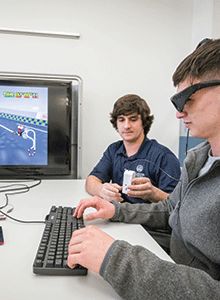Mario Kart Mind Games

Who: Electrical and Computer Engineering students—Nathan Cheong, Stephanie Jones, Scott Miller and Daniel Tagliaferro
What: For their senior project, the students designed a system that measures players’ brain waves to assess their levels of focus while playing Mario Kart, the iconic video game. The more focused the player is, the quicker he or she will be able to move in the game, while lapses of focus slow the player’s Kart.
Advisor: Mark Jupina, PhD, assistant professor
Goal: To help children with attention deficit disorders improve their ability to focus, while having fun at the same time in a low-pressure environment.
How it works: The player dons a pair of neurofeedback glasses, which use sensors to track brain activity. The glasses connect with a device called the Makey Makey, which sends signals based on the measured brain activity to a tiny computer called Raspberry Pi. Using Raspberry Pi, the students designed a program to run in the background of Mario Kart. As the player’s focus level changes, the background program adjusts the speed of the Kart accordingly.
To contain Raspberry Pi, the students 3-D printed a box on which they also installed a line of 10 lights that display the player’s focus level based on his or her brain waves.
In the news: Publicity for the Mario Kart system has included: MobileSyrup.com and Mashable.
